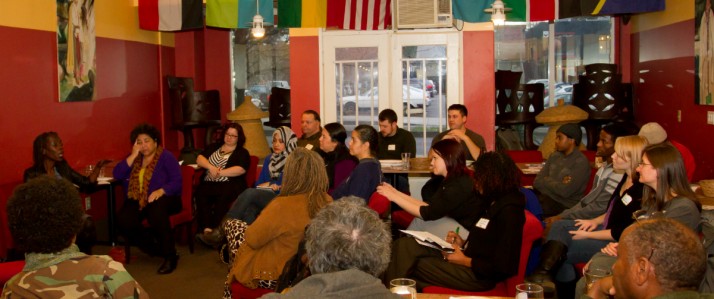The implementation of the Affordable Care Act (ACA) this fall has healthcare at the forefront of my mind and, I’m sure, the minds of many Oregonians. The rollout of healthcare exchanges, minimum quality-of-care standards, protections for those with existing conditions – these are exciting steps toward ensuring we all have access to the medical care we need to achieve our individual potential! And, with 20 percent of Oregonians not covered by health insurance in 2012, the ACA is of particular importance right here at home.
But the landmark healthcare legislation is only one piece of the health puzzle.
More Than the Absence of Disease
I know that healthcare is a racial, social, environmental, and economic justice issue in America. Health is at the heart of so much social justice work, because it isn’t just about an absence of disease.
Health includes having clean air to breath; access to nutritious food; open spaces for activity; and safe neighborhoods in which to live, work, and play. As my friends at Northwest Health Foundation often talk about, these “social determinants of health” can have an even more profound effect on our well being than anything the medical system provides.
What I Was Prepared to Do
As a high school freshman I walked boldly into our local Planned Parenthood, with my head held high and a glint of determination in my eyes, furious that I never saw any women of color featured in their publications or serving on their Teen Councils. I was invited by Ms. Jesalee Fosterling, founder of the local Planned Parenthood, to speak my mind. And I certainly did!
But what I remember most vividly from my conversation with Ms. Fosterling were the questions she asked me:
What do you want me to do?
What are you prepared to do?
Though I didn’t know it at the time, I ended up answering Ms. Fosterling’s question by devoting much of my life to working for a more equitable health system. And I’m certainly not the only one who was prepared to take action.
Organizing for a Healthier Oregon
Oregon is often at the forefront of both healthcare reform and a comprehensive approach to creating healthy communities. Despite technology failures and political standoffs during the ACA implementation, community groups throughout the state are organizing for a healthier Oregon. Consider the massive coalition of social justice organizations – led by MRG grantees and allies including APANO, the Center for Intercultural Organizing (in 2015 became Unite Oregon), Causa Oregon, and Oregon Action – who moved a unified legislative agenda forward this spring. Their impressive results: cultural competence training for healthcare professionals and improved outcomes for marginalized communities.
Or look to Oregon Community Health Workers Association, a first-time MRG grantee in June 2013, who is working to organize a unified voice for community health workers – a vital link between health services and marginalized communities
These are just a few of the fabulous groups organizing for improved health outcomes.
There’s also Beyond Toxics in Eugene, working to eliminate the use of pesticides in public spaces and Friends of Family Farmers, organizing in rural communities to protect our right to safe, local food. In Portland groups like the Community Alliance of Tenants and Right 2 Survive empower Portland’s low income and unhoused communities to demand safe, affordable living conditions.
Whether they’re reforming Oregon’s medical system or addressing environmental and economic inequities, MRG grantees are fundamentally improving the health of Oregonians – and for that I am grateful!
What Will You Do?
More than fifty years later, I am still motivated by Ms. Fosterling’s questions. And, today, I’m going to ask you the same thing. Take to Facebook or Twitter or email and tell me: For a healthier Oregon what do you want me to do and what are you prepared to do?
Our answers and actions can transform and build the healthy, socially-just, and zestful Oregon we deserve.





